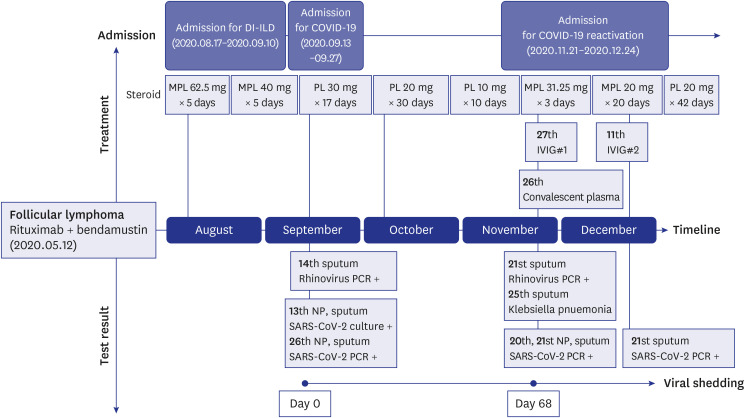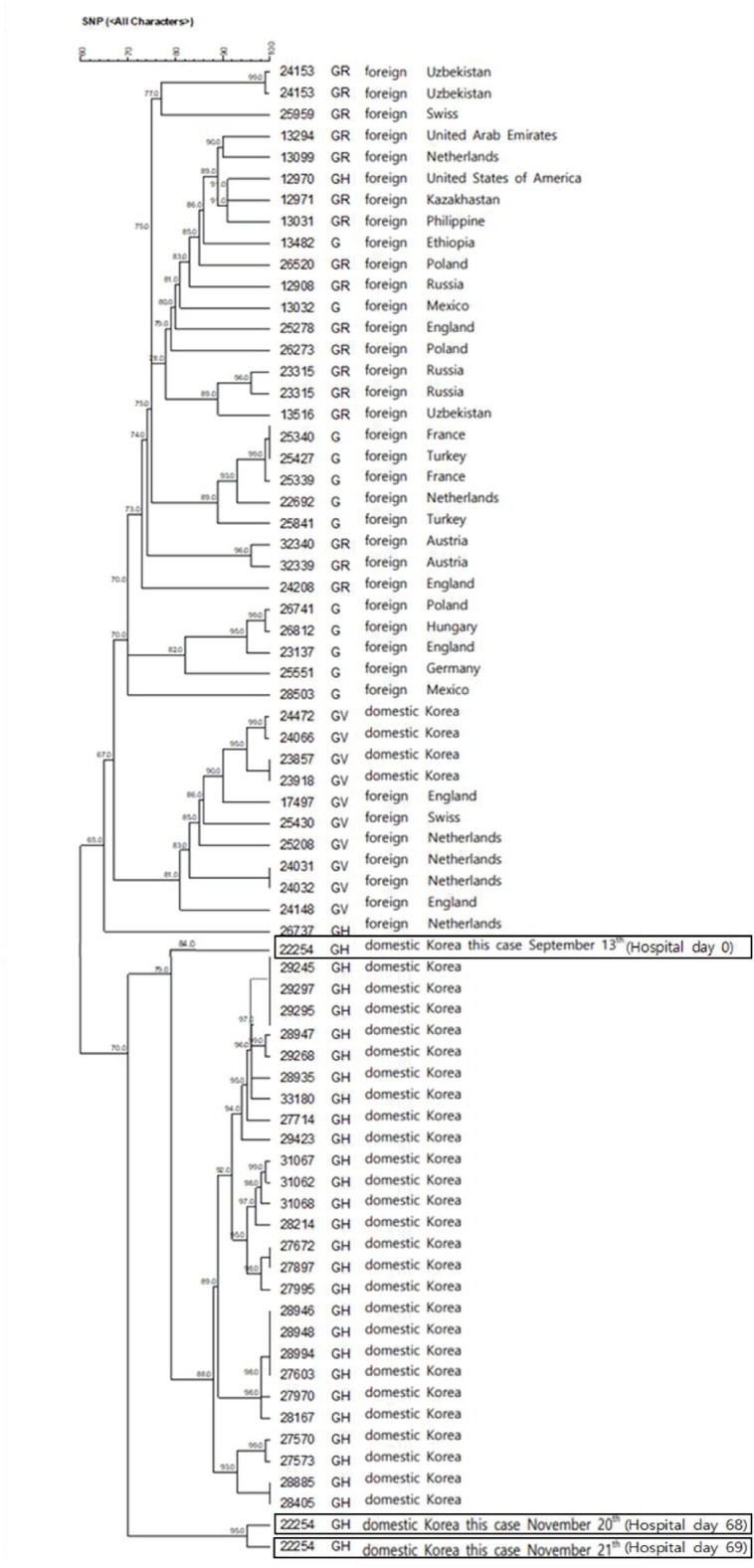J Korean Med Sci.
2023 Jun;38(22):e175. 10.3346/jkms.2023.38.e175.
Within-Host Evolution of SARS-CoV-2 in a B-Cell Depleted Patient With Successful Treatment
- Affiliations
-
- 1Division of Infectious Diseases, Department of Internal Medicine, Soonchunhyang University Seoul Hospital, Soonchunhyang University College of Medicine, Seoul, Korea
- 2Korea Disease Control and Prevention Agency, Osong, Korea
- 3Division of Infectious Diseases, Department of Internal Medicine, Severance Hospital, Yonsei University College of Medicine, Seoul, Korea
- 4Division of Pulmonary and Critical Care Medicine, Department of Internal Medicine, Severance Hospital, Yonsei University College of Medicine, Seoul, Korea
- KMID: 2542806
- DOI: http://doi.org/10.3346/jkms.2023.38.e175
Abstract
- Prolonged viral shedding of severe acute respiratory syndrome coronavirus 2 (SARS-CoV-2) in an immunocompromised host is a challenge as the treatment and infection control for chronic coronavirus disease 2019 infection is not well established and there is a potential risk of new variants emerging. A 48-year-old woman who underwent chemotherapy, including rituximab and steroid, had reactivation of SARS-CoV-2 68 days after the virus was first detected. She successfully recovered after receiving convalescent plasma and intravenous immunoglobulin. Genomic analysis demonstrated that viruses collected from the nasopharyngeal specimens at day 0 and day 68 had 18 different nucleotide mutations, implying within-host evolution after in-depth epidemiologic investigation.
Figure
Reference
-
1. Larson D, Brodniak SL, Voegtly LJ, Cer RZ, Glang LA, Malagon FJ, et al. A case of early reinfection with severe acute respiratory syndrome coronavirus 2 (SARS-CoV-2). Clin Infect Dis. 2021; 73(9):e2827–e2828. PMID: 32949240.
Article2. To KK, Hung IF, Ip JD, Chu AW, Chan WM, Tam AR, et al. Coronavirus disease 2019 (COVID-19) re-infection by a phylogenetically distinct severe acute respiratory syndrome coronavirus 2 strain confirmed by whole genome sequencing. Clin Infect Dis. 2021; 73(9):e2946–e2951. PMID: 32840608.
Article3. Tillett RL, Sevinsky JR, Hartley PD, Kerwin H, Crawford N, Gorzalski A, et al. Genomic evidence for reinfection with SARS-CoV-2: a case study. Lancet Infect Dis. 2021; 21(1):52–58. PMID: 33058797.
Article4. Nakajima Y, Ogai A, Furukawa K, Arai R, Anan R, Nakano Y, et al. Prolonged viral shedding of SARS-CoV-2 in an immunocompromised patient. J Infect Chemother. 2021; 27(2):387–389. PMID: 33328135.
Article5. Hensley MK, Bain WG, Jacobs J, Nambulli S, Parikh U, Cillo A, et al. Intractable coronavirus disease 2019 (COVID-19) and prolonged severe acute respiratory syndrome coronavirus 2 (SARS-CoV-2) replication in a chimeric antigen receptor-modified T-cell therapy recipient: a case study. Clin Infect Dis. 2021; 73(3):e815–e821. PMID: 33507235.
Article6. Choi B, Choudhary MC, Regan J, Sparks JA, Padera RF, Qiu X, et al. Persistence and evolution of SARS-CoV-2 in an immunocompromised host. N Engl J Med. 2020; 383(23):2291–2293. PMID: 33176080.
Article7. Quaranta EG, Fusaro A, Giussani E, D’Amico V, Varotto M, Pagliari M, et al. SARS-CoV-2 intra-host evolution during prolonged infection in an immunocompromised patient. Int J Infect Dis. 2022; 122:444–448. PMID: 35724829.
Article8. Avanzato VA, Matson MJ, Seifert SN, Pryce R, Williamson BN, Anzick SL, et al. Case study: prolonged infectious SARS-CoV-2 shedding from an asymptomatic immunocompromised individual with cancer. Cell. 2020; 183(7):1901–1912.e9. PMID: 33248470.
Article9. Kim IH, Park AK, Kim JM, Kim HM, Lee NJ, Woo SH, et al. COVID-19 variant surveillance in the Republic of Korea. Public Health Wkly Rep. 2021; 14(16):922–929.10. Sacco KA, Abraham RS. Consequences of B-cell-depleting therapy: hypogammaglobulinemia and impaired B-cell reconstitution. Immunotherapy. 2018; 10(8):713–728. PMID: 29569510.
Article11. Gafter-Gvili A, Polliack A. Bendamustine associated immune suppression and infections during therapy of hematological malignancies. Leuk Lymphoma. 2016; 57(3):512–519. PMID: 26696321.
Article12. Fauci AS, Dale DC, Balow JE. Glucocorticosteroid therapy: mechanisms of action and clinical considerations. Ann Intern Med. 1976; 84(3):304–315. PMID: 769625.
Article13. Li P, de Vries AC, Kamar N, Peppelenbosch MP, Pan Q. Monitoring and managing SARS-CoV-2 evolution in immunocompromised populations. Lancet Microbe. 2022; 3(5):e325–e326. PMID: 35309711.
Article14. Dariusz PS, Ankit M. Clinical Applications for Next-Generation Sequencing. Cambridge, MA, USA: Academic Press;2016.15. Park YJ, Cho SY, Lee J, Lee I, Park WH, Jeong S, et al. Development and utilization of a rapid and accurate epidemic investigation support system for COVID-19. Osong Public Health Res Perspect. 2020; 11(3):118–127. PMID: 32528817.
Article16. Piechotta V, Chai KL, Valk SJ, Doree C, Monsef I, Wood EM, et al. Convalescent plasma or hyperimmune immunoglobulin for people with COVID-19: a living systematic review. Cochrane Database Syst Rev. 2020; 7(7):CD013600. PMID: 32648959.
Article17. RECOVERY Collaborative Group. Convalescent plasma in patients admitted to hospital with COVID-19 (RECOVERY): a randomised controlled, open-label, platform trial. Lancet. 2021; 397(10289):2049–2059. PMID: 34000257.18. Clark E, Guilpain P, Filip IL, Pansu N, Le Bihan C, Cartron G, et al. Convalescent plasma for persisting COVID-19 following therapeutic lymphocyte depletion: a report of rapid recovery. Br J Haematol. 2020; 190(3):e154–e156. PMID: 32593180.
Article19. Mira E, Yarce OA, Ortega C, Fernández S, Pascual NM, Gómez C, et al. Rapid recovery of a SARS-CoV-2-infected X-linked agammaglobulinemia patient after infusion of COVID-19 convalescent plasma. J Allergy Clin Immunol Pract. 2020; 8(8):2793–2795. PMID: 32652231.
Article20. Thompson MA, Henderson JP, Shah PK, Rubinstein SM, Joyner MJ, Choueiri TK, et al. Association of convalescent plasma therapy with survival in patients with hematologic cancers and COVID-19. JAMA Oncol. 2021; 7(8):1167–1175. PMID: 34137799.21. Writing Committee for the REMAP-CAP Investigators. Estcourt LJ, Turgeon AF, McQuilten ZK, McVerry BJ, Al-Beidh F, et al. Effect of convalescent plasma on organ support-free days in critically ill patients with COVID-19: a randomized clinical trial. JAMA. 2021; 326(17):1690–1702. PMID: 34606578.22. U.S. Food and Drug Administration. Fact sheet for health care providers: Emergency Use Authorization (EUA) of COVID-19 convalescent plasma for treatment of coronavirus disease 2019 (COVID-19). Updated 2021. Accessed April 28, 2023. https://www.fda.gov/media/141478/download .
- Full Text Links
- Actions
-
Cited
- CITED
-
- Close
- Share
- Similar articles
-
- Understandings and Prospects of Laboratory Diagnosis of SARS-CoV-2
- SARS-CoV-2-Specific T Cell Responses in Patients with COVID-19 and Unexposed Individuals
- Challenges of Scaling Up SARS-CoV-2 Rapid Antigen Tests
- Understanding the Host Innate Immune Responses against SARS-CoV-2 Infection and COVID-19 Pathogenesis
- Microsecond molecular dynamics simulations revealed the inhibitory potency of amiloride analogs against SARS-CoV-2 E viroporin




